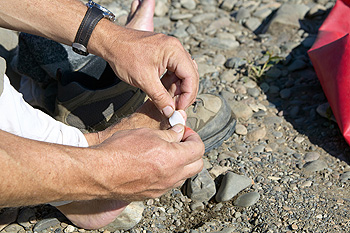Exercising With Blisters
Monday, 11 January 2021 00:00 Foot blisters can be painful and annoying, especially when they get in the way of a good workout. If you find that you have developed a blister on your foot but still want to exercise, it is suggested that you place a large bandage with ample gauze over the blister to protect it. If the blister has popped, let it drain, apply an antibiotic ointment to the area, and cover it with a bandage to prevent infection. Some people are more prone to developing foot blisters. Wearing shoes that fit properly, wearing moisture-wicking socks, and putting sports tape or specialized pads over areas that tend to blister can reduce your risk of getting one. If you have a red or painful blister, or one that is showing signs of infection, it is suggested that you see a podiatrist for treatment.
Foot blisters can be painful and annoying, especially when they get in the way of a good workout. If you find that you have developed a blister on your foot but still want to exercise, it is suggested that you place a large bandage with ample gauze over the blister to protect it. If the blister has popped, let it drain, apply an antibiotic ointment to the area, and cover it with a bandage to prevent infection. Some people are more prone to developing foot blisters. Wearing shoes that fit properly, wearing moisture-wicking socks, and putting sports tape or specialized pads over areas that tend to blister can reduce your risk of getting one. If you have a red or painful blister, or one that is showing signs of infection, it is suggested that you see a podiatrist for treatment.
Blisters are prone to making everyday activities extremely uncomfortable. If your feet are hurting, contact Dr. Anna Petrov of Family Foot & Ankle Care. Our doctor can provide the care you need to keep you pain-free and on your feet.
Foot Blisters
Foot blisters develop as a result of constantly wearing tight or ill-fitting footwear. This happens due to the constant rubbing from the shoe, which can often lead to pain.
What Are Foot Blisters?
A foot blister is a small fluid-filled pocket that forms on the upper-most layer of the skin. Blisters are filled with clear fluid and can lead to blood drainage or pus if the area becomes infected.
How Do Blisters Form?
Blisters on the feet are often the result of constant friction of skin and material, usually by shoe rubbing. Walking in sandals, boots, or shoes that don’t fit properly for long periods of time can result in a blister. Having consistent foot moisture and humidity can easily lead to blister formation.
Prevention & Treatment
It is important to properly care for the affected area in order to prevent infection and ease the pain. Do not lance the blister and use a Band-Aid to provide pain relief. Also, be sure to keep your feet dry and wear proper fitting shoes. If you see blood or pus in a blister, seek assistance from a podiatrist.
If you have any questions, please feel free to contact one of our offices located in Wheeling and Chicago, IL . We offer the newest diagnostic and treatment technologies for all your foot care needs.







